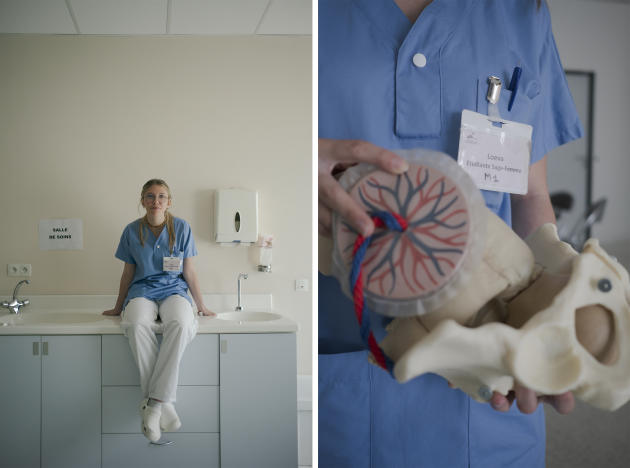At 21, Loeva Girardin is not yet a mother and has already given birth to around thirty babies. She just finished her 4e year of midwifery school and is already aware that her profession is “the most beautiful in the world, but also sometimes the worst”. Because it is close to life, but also to death. Just like her mother, Mathilde Girardin, and her grandmother, Elisabeth Gaud, before her, Loeva accompanies the choice of women to be or not to be a mother and the way in which they wish to give birth to their child.
In this line of midwives, it is a question sensitivity, reappropriation by women of their bodies and feminist commitments. Constants transmitted by Elisabeth, 74, and anchored in each of them. First with her 47-year-old daughter, Mathilde, who has been living for nine years as a liberal midwife in Montaigu (Vendée), after having worked in the hospital for nineteen years. And now with his granddaughter, a student in Nantes.
Gathered in La Montagne (Loire-Atlantique) on Friday May 26, they leaf through Loeva’s revision manuals, and note that, if the job remains the same, certain approaches have changed. Their opinions sometimes diverge on the innovations brought to the profession. The fruit of their professional careers, but also of their life as women in a society that has undergone significant changes in fifty years. But all three listen to each other sympathetically.
Elisabeth’s journey is marked by the long struggle of women to dispose of their bodies. At the beginning of the 1970s, she started studying midwifery against the advice of her parents, who felt that this sector was not rewarding. Her desire for a child – which she has “always had against all odds” – forces him to interrupt his course. Pregnant with her first child at 21, she has had three pregnancies in three years and will never resume her training.
“A little seed in my brain”
One day, while raising her children in Roubaix (North), a young woman knocks at her door. She tries to meet her husband, a medical intern, to make him aware of the difficulties encountered by women to have an abortion. “It made me tilt. » She then committed herself to contraception and abortion, and women’s rights. “I immediately joined the group of women who practiced the Karman method – these abortions by aspiration using a large syringe, which did not damage the cervix. [de l’utérus] », she says. The coal mines of the North no longer bore so good. In the settlements of Roubaix, families did not always have the means to feed several children.
You have 69.79% of this article left to read. The following is for subscribers only.
